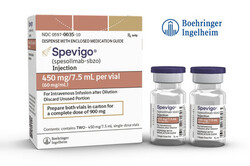The health authorities recently designated “systemic pustular psoriasis” as a rare disease and included it in this year's special calculation targets, opening the way for the use of Spevigo (spesolimab) for the disease’s treatment.
However, a big hurdle of insurance benefits remains before its treatment using Spevigo in earnest, industry insiders said, drawing attention to the price negotiation with the National Health Insurance Service (NHIS) and the pharmaceutical company’s willingness to share the financial burden.
According to the “Criteria for Special Exceptions for Co-payment Calculation” revised by the Ministry of Health and Welfare at the end of last year, systemic pustular psoriasis (L40.1) was included in the rare disease calculation exception from Jan. 1, 2024.
With the designation of systemic pustular psoriasis as a rare disease and the establishment of a special calculation code, Koreans with systemic pustular psoriasis who have been in the welfare blind spot will be able to pay only 10 percent of the treatment costs for outpatient or inpatient treatment.
Systemic pustular psoriasis is an extremely rare disease with a prevalence rate of less than 1 percent among all psoriasis diseases. It is estimated that there were about 3,000 patients in Korea in 2021. However, it has not been officially recognized as a rare disease, and patients have not been able to receive welfare benefits.
Since 2018, patients have asked the government to designate systemic pustular psoriasis as a rare disease. As a result, it has been recognized as a rare disease under national management after six years.
The most important change for patients in Korea is that they will only have to pay 10 percent of the cost of new drugs recently introduced.
Unlike plaque psoriasis, which accounts for 85 to 90 percent of all psoriasis, systemic pustular psoriasis is characterized by repeated exacerbations of symptoms due to much higher expression of the interleukin-36 receptor (IL-36R).
Until now, there has been no officially licensed treatment for systemic pustular psoriasis in Korea, but with the introduction of Spevigo last year, Korean patients now have a treatment option other than steroids.

Spevigo is a monoclonal antibody biologic that binds to IL-36R and exerts its therapeutic effects by inhibiting interleukin receptor downstream signaling that causes inflammatory responses. On Aug. 9, 2023, it won approval from the Ministry of Food and Drug Safety for treating acute exacerbations in adult patients with systemic pustular psoriasis.
Establishing a special reimbursement code for systemic pustular psoriasis has created a treatment environment that can ease the burden of Spevigo's treatment costs. Still, the biggest obstacle remains reimbursement.
Since Spevigo is an innovative new drug that only a few people are treated with, it is expected that the government and pharmaceutical companies will disagree on the price of the drug, and it may take a long time to review and negotiate the benefits.
Therefore, the sources said that the willingness of Boehringer Ingelheim, which owns Spevigo, to share the financial burden is expected to be key in the future reimbursement assessment and drug price negotiation.

